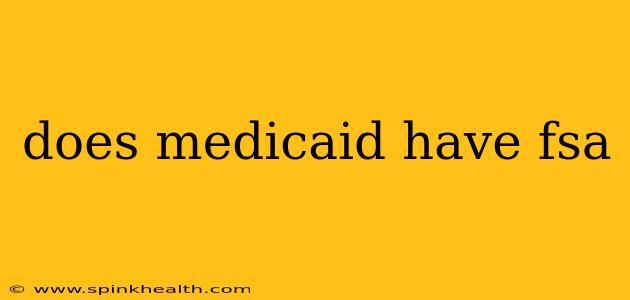Does Medicaid Have an FSA? Unraveling the Healthcare Funding Maze
The question, "Does Medicaid have an FSA?" is a common one, stemming from the understandable desire to understand how different healthcare funding mechanisms interact. The short answer is: No, Medicaid does not have a Flexible Spending Account (FSA). Let's delve deeper into why this is the case and explore related concepts that often lead to this question.
My journey into understanding this complex topic began with a conversation with a friend who was struggling to navigate the intricacies of healthcare financing. She was confused about the different options available and how they interacted, particularly the relationship between Medicaid and FSAs. This sparked my interest, and what follows is the result of my research and conversations with healthcare professionals.
What is Medicaid?
Medicaid is a joint federal and state government program that provides healthcare coverage to millions of low-income Americans, including children, pregnant women, seniors, and people with disabilities. It's a crucial safety net, ensuring access to essential medical services for those who otherwise couldn't afford them. Funding for Medicaid comes from both federal and state tax revenues, distributed according to a complex formula.
What is an FSA?
A Flexible Spending Account (FSA) is a pre-tax savings account offered by employers. Employees can contribute a portion of their pre-tax salary to the FSA to pay for eligible healthcare expenses. The key benefit is the tax savings – money contributed to an FSA is not subject to income tax or payroll taxes. This makes it a valuable tool for those with employer-sponsored healthcare plans to offset out-of-pocket healthcare costs.
Why Doesn't Medicaid Have an FSA?
The fundamental reason Medicaid doesn't have FSAs is because of its core purpose and the nature of FSAs. Medicaid is a government-funded program designed to provide healthcare coverage for low-income individuals. FSAs, on the other hand, are employer-sponsored benefit plans. They are offered as a supplemental benefit to employees to help them manage healthcare costs in conjunction with their employer-provided health insurance. Medicaid recipients, by definition, are not typically employed and receiving employer-sponsored health insurance, hence the incompatibility.
What are some similar options for Medicaid recipients?
While Medicaid doesn't offer FSAs, there are other ways to manage healthcare costs:
-
Medicaid's coverage: Medicaid itself covers a wide range of healthcare services, reducing or eliminating out-of-pocket expenses for many. Understanding the specific coverage provided by your state's Medicaid program is crucial.
-
State-specific programs: Some states offer additional programs or initiatives to assist Medicaid recipients with healthcare costs not fully covered by Medicaid. This is an area where researching your state's resources is beneficial.
-
Charity care: Many hospitals and healthcare providers offer charity care to individuals who cannot afford medical bills. Eligibility criteria vary, but it's a resource worth investigating if facing significant medical expenses.
-
Negotiating payment plans: Many healthcare providers are willing to work with patients on payment plans to make healthcare more affordable.
Can I use an FSA with Medicaid?
This is a nuanced question. If you have employer-sponsored health insurance in addition to Medicaid (for example, supplemental coverage for services not covered by Medicaid), you might be able to use an FSA with your employer-sponsored plan. However, you cannot use an FSA to pay for expenses already covered by Medicaid.
What are the eligibility requirements for Medicaid?
Medicaid eligibility requirements vary by state. Generally, eligibility is based on income, assets, and household size. You'll need to contact your state's Medicaid agency to determine your eligibility and apply for coverage.
Navigating the healthcare system can be complex, especially when dealing with multiple programs. Understanding the differences between programs like Medicaid and FSAs, as well as the options available, is crucial to accessing the healthcare you need. If you have questions about your specific situation, consulting a healthcare professional or your state's Medicaid agency is highly recommended.

